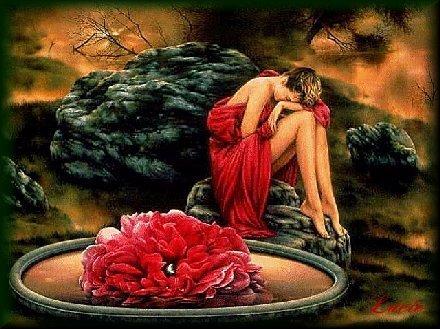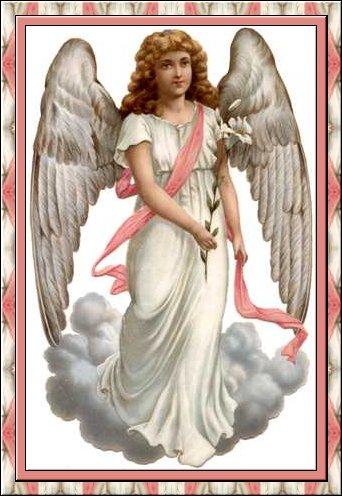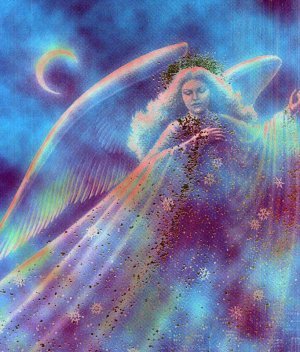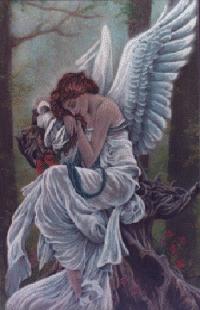

In April of 1991, I was diagnnosed with breast cancer. After having 3 opinions, the consensus was that I have a mastectomy. I was literally in shock. My husband and I sat in the doctor's office, me not hearing anything that was being said. I had driven there from work to meet my husband. Driving home wasn't an option for me. As we pulled in the driveway, my 15 year old daughter came out of the house asking, "What's wrong?"
I was literally shivering from "shock", I remember my husband telling our daughter, "Mom has breast cancer and has to have her breast removed. Go get a blanket for her".
Wow, this had been a difficult 6 months. My dad had died from a massive heart attack. My mother was diagnosed with breast cancer only one month before and had had a mastectomy. Here I found myself and family going through another nightmare.
The next couple of days were a blur. I tried to get my mind set as well as I could for this. For the first time in my 38 years I actually had felt good about myself physically. And, now this! We women are a vain lot. My thoughts at first were mainly "physical" worries. Then, it hit me...I had the "Big C"! What if it were incurable? What if I had to take chemo? What if I never lived to watch my children grown? The "what ifs" were unending in my mind.
I tried to keep myself busy. My husband and I went shopping. I bought new comfortable, cotton pajamas (I was determined not to be in those ugly hospital gowns any longer than necessary).
As we walked through the store, I spotted a pair of "bunny" house slippers. We bought them, my thought being, they would be a "conversation piece" and maybe lighten conversation when my friends and family visited. (And, that did work, by the way!)
The surgery was performed and I awakened before noon to family and friends surrounding me. I did feel so loved.
The incision was uncomfortable, but the pain was not unbearable. I slept off and on during the afternoon and evening.
Sometime during the wee hours of the morning...I awoke. I could feel the presence of someone else in the room. There was little light in the room. I asked, "Is someone there?"
From across the room came a voice, "Yes, I just wanted to check on you. Are you okay? Is there anything I can do for you? I know this must be very difficult for you."
I asked, "I guess you've come to give me more medication?"
"No," came the answer, "I just felt as if I were being lead to come into this room and speak to you". As we talked, she proceeded to tell me she was not a particularly religious person, but something or someone told her to spend some time with me. That I needed a friend to share some of my pain with. And, that I did.
As I lay there quietly in the dark, with tears slowly streaming down my face, this wonderful nurse shared the hurt I was feeling. She spoke such comforting words and her voice had such a calming effect on me. We talked for what seemed like a long while (although I'm not sure about my concept of time at that point).
As she prepared to leave she told me she would not be working the next few days and would not be around when I left the hospital, but that she would check on me.
I thanked her for being so kind and I told her, "You're my Guardian Angel".
Because someone took the time to listen and give words of encouragement, I believe my acceptance of the breast removal was much easier. I awoke the next morning actually rested.
My "Guardian Angel" had told me I would "have to" view my incision before I would be allowed to leave the hospital. I got myself out of bed, gave myself a "sponge bath", and even "french-braided" my own hair. The last thing I did, before I prepared for my doctor to arrive and knowing visitors would be showing up, was look at my incision.
It was a difficult thing to do. Yet, not nearly as bad as I had pictured. My "Guardian Angel" had described what it would look like. My doctor came in to check on me, as he was leaving he said, "Now, you know you'll have to look at your incision before you can be released." He was amazed when I told him, "Yes and I've already been there, done that!"
I had visitors through the morning, but imagine what I thought when a vase was brought to me holding a beautiful yellow rose and a yellow "stuffed" duck with a note pinned on it saying, "From Your Guardian Angel!"
For a moment I wondered if I had experienced this visit from a "true" angel. No one seemed to know who had sent the gifts...at least they wouldn't say.
Later that afternoon, a young woman stopped by with two children, said she was the nurse who had talked to me during the night before. She was going out of town and wanted to check on me.
As she started out the door I asked, "The rose and duck were from you, weren't they?"
She only raised her eyebrows and waved goodbye with a smile.
What a rare and precious gift God gave to me by sending someone to me in my time of need.
And, yes, she truly is a "Real Angel on Earth".
P.S. I am a Breast Cancer Survivor -- cancer free for nearly 10 years! I've had re-constructive surgery and lead a normal, active life. I do thank God for each day I am given.
My perspective on life and how to live it changed after my experience with breast cancer. The mundane things in life I considered so important, now take a "back seat", Watching a sunrise, seeing a rainbow, reading a book and taking a walk through Autumn leaves with my grandchild are just a few of the things I consider most important now.
May you be blessed with your own "Earth Angel"!
Your friend,
Donna




Have you had an encounter
with an Angel?
Do you know someone
like this?
Tell me your story!
Once a month or more we will publish
a story of an Angel encounter.
Please do not use real names.
Send your stories to:

This page has been visited
Personal History. Women who have had breast cancer and women with a history of breast disease (not cancer, but a condition that may predispose them to cancer) may develop it again.
Family History. The risk of getting breast cancer increases for a woman whose mother, sister, daughter, or two or more close relatives have had the disease. It is important to know how old they were at the time they were diagnosed.
The Breast Cancer Genes. Some individuals, both women and men, may be born with an "alteration" (or change) in one of two genes that are important for regulating breast cell growth. Individuals who inherit an alteration in the BRCA1 or BRCA2 gene are at an "inherited" higher risk for breast cancer. They also may pass this alteration on to their children. It is very rare Ė scientists estimate that only about 5-10 percent of all breast cancers are due to genetic changes. One out of two women with these changes are likely to develop breast cancer. Women with a family history of breast cancer are encouraged to speak to a genetics counselor to determine the pros and cons of genetic testing.
The next three risk factors all involve estrogen, a hormone that naturally occurs in every woman. At the time menstruation begins, women start to produce larger amounts of estrogen and will continue to do so until they reach menopause. Estrogen appears to play a key role in breast cancer. Although estrogen doesn't actually cause breast cancer, it may stimulate the growth of cancer cells. Estrogen-related risk factors are:
Having an early first period. Women who begin menstruating before age 12 are at increased risk of developing breast cancer. The more menstrual cycles a woman has over her lifetime, the more likely she is to get the disease.
Having a first pregnancy after age 25 or 30. Although early pregnancies may help lower the chances of getting breast cancer, particularly before the age of 25, these same hormonal changes after age 35 may contribute to the incidence of breast cancer.
Having no children. Women who experience continuous menstrual cycles until menopause are at a higher than average risk.
Other risk factors Ė and lifestyle choices to avoid them
Common to all women are daily lifestyle decisions that may affect breast cancer risk. These day-to-day choices involve factors such as poor diet, insufficient physical activity, alcohol use, and smoking. Besides possibly reducing breast cancer risk, lifestyle improvements represent smart steps for a healthier life, since they can help prevent heart disease, diabetes, and many other chronic, life-threatening conditions.
Decrease your daily fat intake Ė especially saturated or hydrogenated fats. Eat leaner meats and limit red meat. Reducing your fat intake helps prevent other health problems, such as heart disease and stroke, and may reduce your chance of developing breast and colon cancers.
Increase fiber in your diet. Fiber is found in whole grains, vegetables, and fruits. This type of diet is beneficial for your heart and can help prevent other cancers, such as colon cancer.
Eat fresh fruits and vegetables. In addition to their fiber content, fruits and vegetables have antioxidant properties and micronutrients that may help prevent some cancers.
Limit alcohol. Evidence suggests that a small increase in risk exists for women who average two or more drinks per day (beer, wine, and distilled liquor).
Stay active. The U.S. Surgeon General recently reported that you can help prevent many health problems by engaging in a moderate amount of physical activity (such as taking a brisk, 30-minute walk) on most days of the week. Strive to maintain the body weight recommended by a health professional, since excess fat may stimulate estrogen production.
Donít smoke. Although smoking doesnít cause breast cancer, it can increase the chance of blood clots, heart disease, and other cancers that may spread to the breast.
Find an Angel
Story Number 3 "Christmas Angels":
Story Number 2 "Angel in a Hard Hat":
Story Number 1 "The Teenager":
Angel Gallery:
Angels Residing on The Net:
Tom's Pit Stop Racing(hubby's homepage):
Cat and Sam's Homepage :
My Daughters Homepage:
My Other Daughters Homepage:






| Search Tripod's Internship Database | Check Out the Tripod Members' Recipe Book |